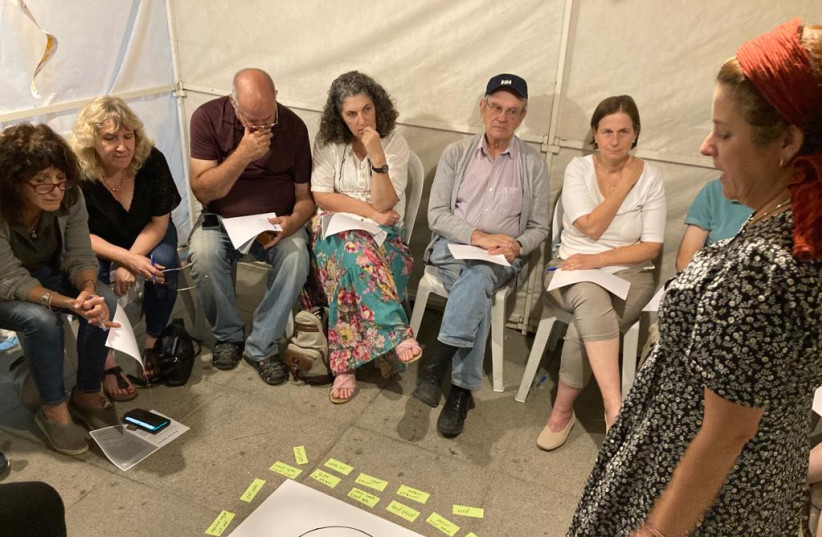Safeguarding Our Shared Home, the protest group opposing the government’s judicial reforms, and 929, the Jewish learning project, have launched a week-long project to facilitate dialogue between Israelis through visits to each other’s sukkot.
Participants can register using a small form on the project’s website, to host or be hosted on any day throughout the remainder of the holiday, for “in-depth, meaningful conversations, that will strengthen the sense of connection, of Israeli unity,…in the midst of these very challenging and complicated times.”
Among the leaders of the project is Rabbi Dr. Benny Lau, the head of 929: “The shared home of us all - the State of Israel - is in danger,” Lau said. “We have to stop, talk, get to know one another beyond clichés and extreme statements.” Lau connected the need for dialogue to the Sukkot holiday, “the holiday of guess, in which we all leave the comforts of home for the public space where we all must live together.”

A singer, an MK, and a Supreme Court Justice walk into a sukkah
To guide the conversation, each sukkah will host a facilitator, including some major figures in Israeli culture and politics: musicians Barry Sakharof and Shai Tzabari will be facilitators, as will former MK Yehuda Glick, and Justice Elyakim Rubinstein, former Vice President of the Supreme Court. The organizers hope to cast a broad net, bringing together leaders from across the Israeli political spectrum, and drawing participants from different corners of Israeli society.
To aid discussions, Shared Home prepared a ‘source sheet,’ which a member of the organization shared with the Jerusalem Post. The first page places Leviticus and Maimonides next to Israel’s Declaration of Independence, and the subsequent pages similarly put contemporary Israeli sources in conversation with Jewish tradition. The project is being supported by several institutions of Jewish learning, including the Hadar Institute and Ein Prat.
The first day of the project, Sunday, October 1, 2023, included nineteen conversations hosted in sukkot across the country. Four of these were held in Jerusalem, and each of the others was in its own locale. Sites included the kibbutz Ramat Rachel, the moshav Shorashim, and the Tekoa, Piduel, and Alon Shvut settlements in the West Bank.
The endeavor has not been without controversy. Rav Shimeon ben Shaiyah, a columnist for the religious-Zionist outlet Srugim, called the project a sort of Christianization. On social media, similarly cynical sentiments were expressed from the other direction as well.
'A lot of pain, and a lot of faith, in our nation'
But despite the cynics, Israelis turned out.
“I think it was a great success,” said Michal Muszkat-Barkan, one of the organizers, following the project's first night. “So many people from all over the country– from different sectors, from city and country, north and south, invited others into their sukkah, and so many people wanted to come.”
“It didn’t surprise me,” Muszkat-Barkan said, “because I felt the need for face-to-face conversation. But it was very, very moving.”
Looking towards the rest of the week, she hopes that the numbers will only grow: “I hope people feel that they are able to talk to each other, that the atmosphere of hate and suspicion that we live in… won’t defeat us.”
“There is a lot of pain, and a lot of faith, in our nation,” she said. “People want to speak, and to listen.”
